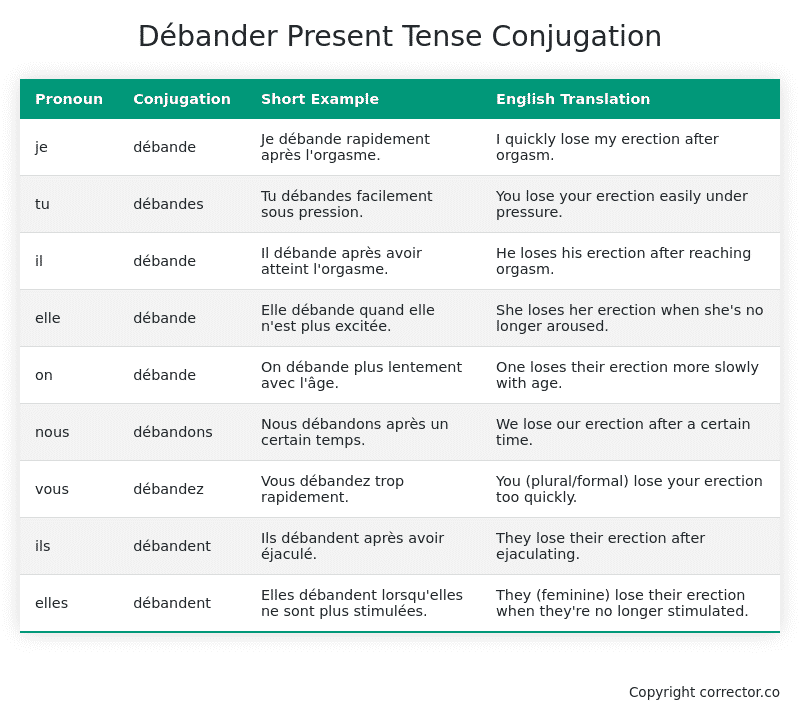Le Present (Present Tense) Conjugation of the French Verb débander
Introduction to the verb débander
The English translation of the French verb “débander” is “to lose one’s erection.” The infinitive form “débander” is pronounced as /de.bɑ̃.de/ in French.
The word “débander” originates from the combination of the prefix “dé-” meaning “to undo” or “to remove” and the verb “bander” meaning “to band” or “to tie.” In everyday French, “débander” is used to describe the loss of an erection, typically in a sexual context.
Examples:
- Il a eu une débandade au milieu de l’acte.
(He lost his erection in the middle of the act.) - Ne t’inquiète pas si tu débandes, c’est normal parfois.
(Don’t worry if you lose your erection, it’s normal sometimes.) - Après avoir bu trop d’alcool, il avait du mal à ne pas débander.
(After drinking too much alcohol, he had trouble maintaining his erection.)
Please note that the topic may be sensitive or explicit to some individuals.
Débander – About the French Present Tense
To take a deep dive into all the French tenses then see our article on Mastering French Tense Conjugation.
Common Everyday Usage Patterns For Le Present
Interactions with Other Tenses
Table of the Present Tense Conjugation of débander
| Pronoun | Conjugation | Short Example | English Translation |
|---|---|---|---|
| je | débande | Je débande rapidement après l’orgasme. | I quickly lose my erection after orgasm. |
| tu | débandes | Tu débandes facilement sous pression. | You lose your erection easily under pressure. |
| il | débande | Il débande après avoir atteint l’orgasme. | He loses his erection after reaching orgasm. |
| elle | débande | Elle débande quand elle n’est plus excitée. | She loses her erection when she’s no longer aroused. |
| on | débande | On débande plus lentement avec l’âge. | One loses their erection more slowly with age. |
| nous | débandons | Nous débandons après un certain temps. | We lose our erection after a certain time. |
| vous | débandez | Vous débandez trop rapidement. | You (plural/formal) lose your erection too quickly. |
| ils | débandent | Ils débandent après avoir éjaculé. | They lose their erection after ejaculating. |
| elles | débandent | Elles débandent lorsqu’elles ne sont plus stimulées. | They (feminine) lose their erection when they’re no longer stimulated. |
Other Conjugations for Débander.
Le Present (Present Tense) Conjugation of the French Verb débander (You’re reading it right now!)
Imparfait (Imperfect) Tense Conjugation of the French Verb débander
Passé Simple (Simple Past) Tense Conjugation of the French Verb débander
Passé Composé (Present Perfect) Tense Conjugation of the French Verb débander
Futur Simple (Simple Future) Tense Conjugation of the French Verb débander
Futur Proche (Near Future) Tense Conjugation of the French Verb débander
Plus-que-parfait (Pluperfect) Tense Conjugation of the French Verb débander
Passé Antérieur (Past Anterior) Tense Conjugation of the French Verb débander
Futur Antérieur (Future Anterior) Tense Conjugation of the French Verb débander
Subjonctif Présent (Subjunctive Present) Tense Conjugation of the French Verb débander
Subjonctif Passé (Subjunctive Past) Tense Conjugation of the French Verb débander
Subjonctif Imparfait (Subjunctive Imperfect) Tense Conjugation of the French Verb débander
Subjonctif Plus-que-parfait (Subjunctive Pluperfect) Tense Conjugation of the French Verb débander
Conditionnel Présent (Conditional Present) Tense Conjugation of the French Verb débander
Conditionnel Passé (Conditional Past) Tense Conjugation of the French Verb débander
Conditionnel Passé II (Conditional Past II) Tense Conjugation of the French Verb débander
L’impératif Présent (Imperative Present) Tense Conjugation of the French Verb débander
L’impératif Passé (Imperative Past) Tense Conjugation of the French Verb débander
L’infinitif Présent (Infinitive Present) Tense Conjugation of the French Verb débander
L’infinitif Passé (Infinitive Past) Tense Conjugation of the French Verb débander
Le Participe Présent (Present Participle) Tense Conjugation of the French Verb débander
Le Participe Passé (Past Participle) Tense Conjugation of the French Verb débander
Struggling with French verbs or the language in general? Why not use our free French Grammar Checker – no registration required!
Get a FREE Download Study Sheet of this Conjugation 🔥
Simply right click the image below, click “save image” and get your free reference for the débander present tense conjugation!

I hope you enjoyed this article on the verb débander. Still in a learning mood? Check out another TOTALLY random French verb present conjugation!


